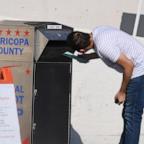After Osama Bin Laden, Rage over Airport Security Continues
Has the death of Osama bin Laden failed to dampen security concerns?
May 12, 2011— -- Did you hear about the two Muslim religious leaders -- both residents of the Memphis area -- who missed their Atlantic Southeast Airlines flight last week? No, this wasn't a security problem per se. They were cleared by Transportation Security Administration (TSA) officers and boarded the plane. Then, according to news reports, the pilot told them to take a hike.
Which no doubt gave the two gentlemen plenty to talk about at the conference in Charlotte they were headed to -- a conference on prejudice against Muslims (by the way, the men eventually received an apology and were put on another flight).
Maybe this signifies nothing more than an alleged bias on the part of the pilot, or perhaps a misplaced concern for passengers (the pilot reportedly refused to fly with the religious leaders "because some other passengers could be uncomfortable"). Or maybe it signifies a certain hysteria that the death of Osama bin Laden has done little to dampen.
Even with Bin Laden gone, flight security remains a hot-button topic for many Americans.
For more travel news and insights see Rick's blog at farecompare.com
Sure, most people through the motions of airport security without outward protest, but many vent their bile over what they see as foolish or inept security measures on the world's bulletin board: the Internet. And the rage continues.
If you don't think so, just look at some of the comments left on the TSA's own blog. Here's one:
"Unlike shoes, shampoo, mastectomy scars, breast prostheses, and ostomy bags, bin Laden was an actual threat, and thus no concern of TSA."
The author of this comment is no doubt referring to the alternative to the body scanner: the "enhanced" pat-down. I've had both, and was certainly not crazy about my vigorous pat-down; when given a choice, I'll opt for the scan, with some misgivings (I'd like to see more testing and research done on any possible long-range health effects of these machines).




